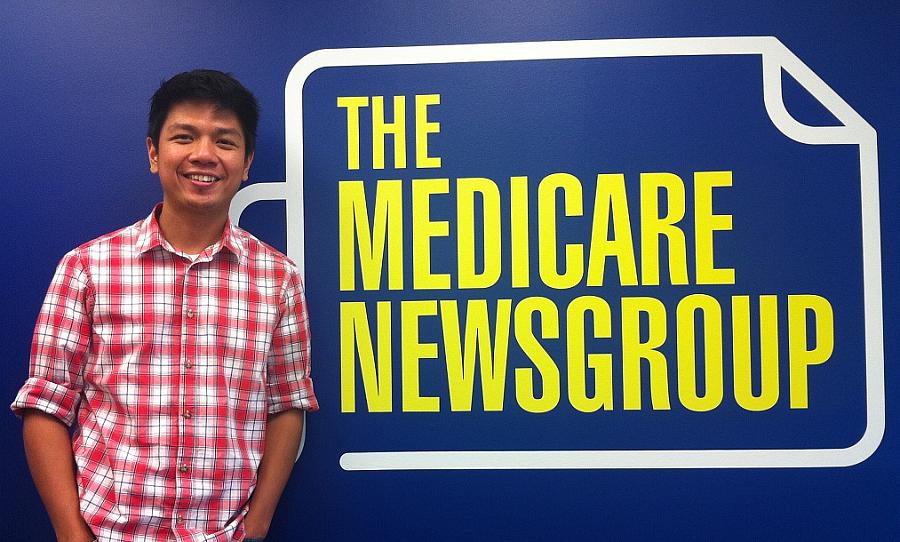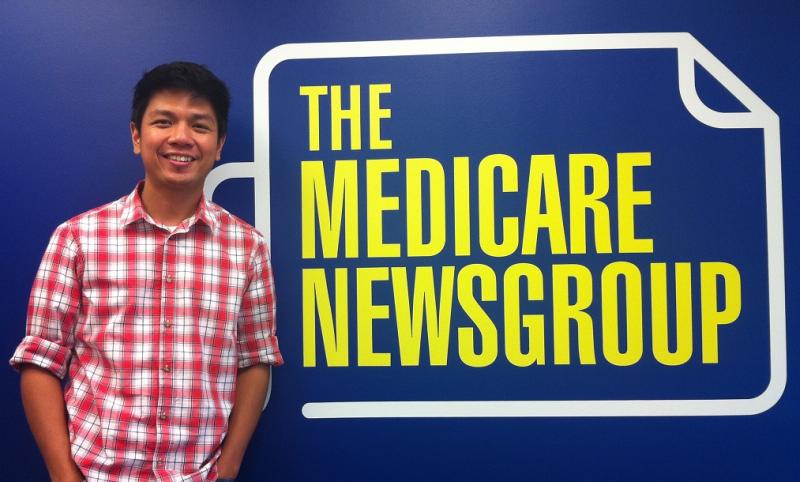Why Kimber Solana Left Newspapers to Focus on Health at Medicare NewsGroup

Kimber Solana spent nearly three years working for small-town daily newspapers after he graduated from Medill School of Journalism at Northwestern University. He had specialized in health as a student, but never on the job. As a geneeral assignment reporter at the Salinas Californian and then the Racine Journal Times in Wisconsin, he worked on breaking news, city politics and crime.
So when Solana, 27, got the chance to get back to health, he grabbed it, even though it meant leaving newsrooms. Since January, he's been a web producer/reporter for the new Medicare NewsGroup, a site for journalists to better understand the complicated federal program.
This week in Career GPS, Solana talks about moving on from small town newspapers, ultra-niche web publishing and his new job.
Angilee Shah: You've spent almost three years in daily newspapers. Did you like your jobs there? Or was there something that nagged at you and made you want to do a different kind of project?
 Kimber Solana (left): The nag was always that I wanted to do health reporting or health writing in general. But, you know, with journalism these days, you take what you can get. It actually took me six months after I graduated to land a job. I did a few freelancing gigs and a paid internship in Chicago and I was kind of picky. Ultimately, after a few months, the student loans were about to kick in and I needed to find a job.
Kimber Solana (left): The nag was always that I wanted to do health reporting or health writing in general. But, you know, with journalism these days, you take what you can get. It actually took me six months after I graduated to land a job. I did a few freelancing gigs and a paid internship in Chicago and I was kind of picky. Ultimately, after a few months, the student loans were about to kick in and I needed to find a job.
As an undergraduate, I was at California State University in Monterey Bay, which is in the area that the Salinas Californian covers. So when I got offered the job, I took it immediately because I was familiar with the area. I was nervous because in the Medill program I focused on health and science and was suddenly thrown into a daily. I wasn't sure I would be able to do two or three stories per day. But I figured it out and really did have fun.
The Salinas Californian is a six-day-a-week paper with one big weekend edition. My last few months there we ended up doing major pieces for the pieces for the weekend, and that gave me chance to apply for California Health Journalism Fellowship. My project, about post-traumatic stress disorder caused by community violence, was published the weekend after I left in 2011.
Then you went to Wisconsin for a little while?
I was in Wisconsin and, partially because I wanted to move back to Chicago and because I wanted to get back to health reporting, from time to time I would browse the Medill list serve to see what jobs were open.
I found the Medicare Newsgroup -- it was a startup and I was a little nervous about it but I figured, how much more secure is a job in a daily newspaper really? I just crossed the bridge and applied for it, and started in the first week of January.
With the Medicare Newsgroup, you are a web producer, right? What does that job entail?
Right now, because we just officially launched this month, I'm doing a lot of web producing, posting a lot of information on the website and aggregating Medicare-related news. It's not a lot of reporting and writing yet but ultimately I'll be doing more original reporting and some investigative pieces involving Medicare.
I've been filling my head for the past four months with nothing but Medicare. I'm probably more familiar with it than the average person my age, but as soon as we get into a regular groove, hopefully, I'll do more reporting.
When you got your new job, did you have web skills already?
I had a good background because at Medill it was really emphasized - content management systems, search engine optimization, etc. Those things were also covered in the daily newspapers. Whenever I covered a news story or an event it was always emphasized to break the news online and then write up something that would spin the story forward for tomorrow's paper.
I'm pretty confident in saying that I gained the skills for a web production role from just being a reporter at two small newspapers. It was up to us as reporters to post things online after they were edited. The whole social media aspect of sharing our stories was also up to us. We usually had a web editor, but sometimes that web editor was also in a reporting role, so it was a lot of shared responsibilities. We were focused on putting out a paper the next day, but we were also making sure the website was updated, maintained and breaking news.
How does working at the Medicare NewsGroup compare to your old job? Do you like the pace of it or is there something you miss about daily newspapers?
I'll always miss the adrenaline rush of breaking news - I spent almost three years covering crime and city politics. But I made the conscious decision to get back to health care. It's different but just as exciting. Medicare reform is a hot topic right now -- there's no doubt about that.
The pace is a lot less stressful, that's for sure. I wouldn't say it's slower but I'm not competing with other daily newspapers on breaking news. We're more of an informational site to help journalists cover Medicare. It's a completely different environment than a daily newspaper, especially two small daily newspapers.
When you were at Medill, did you picture yourself doing a job like this?
No, I pictured myself working for the Chicago Sun-Times. But I don't think journalists should be afraid of doing different projects, especially with startups. My personal view of it is that if an opportunity presents itself, you should go for it if that was something you were looking to do. You shouldn't be afraid of getting out of where you thought you'd be. It's not just in journalism -- that goes for any job.
So think about subject matter rather than the medium?
Yes. For me that was the breaking point -- I wanted to do something that was health-related. There's not a lot of health reporting jobs out there, so when this opportunity presented itself, I said, sure, I'll do that.
And you'll come out a Medicare expert.
Exactly. In a few more months or after a year, I'll be an expert on Medicare. It's such a hot topic, especially in an election year.
Thanks for your time, Kimber.
The Medicare NewsGroup launched at the beginning of April. It is a for-profit endeavor based on a sponsorship model. Their major sponsor is the insurance company Humana. Solana says there is a wall between sponsors and editorial content; sponsors do not influence the reports and analyses on the site.
Solana also says that the publishers wanted to help make coverage of Medicare more meaningful, which is why the site is aimed at journalists. It is built as a backgrounder site with a lot of aggregated content and explainers of the complex federal program. Check out the Newsmakers section, which highlights interesting people in the Medicare realm. They also maintain an expert list for journalists to find sources. Registered members can store clips for easy browsing later on.
Related Reading:
Career Profile: M.J. Ellington takes health journalism out of the newsroom
Year of the Blogger: Why Carey Goldberg loves her new medium
Office Hours: Journalism professors discuss specializing in health
Career Profile: Veteran health reporter finds new opportunities outside newspapers
Getting the Job: What a startup journalist looks for in new hires

